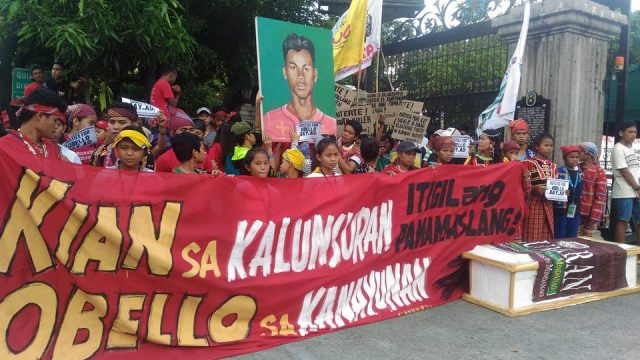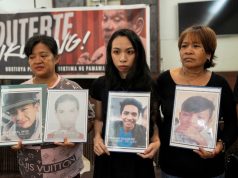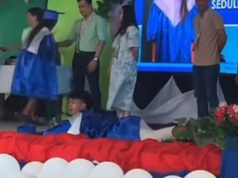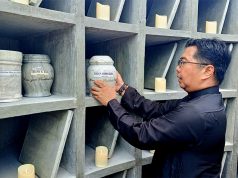
Had Obello Bay-ao not gone home to Talaingod, Davao del Norte to help with the farming, the Grade 7 student of the Salugpongan Tu Tano Igkanogon-Community Learning Center Inc., a lumad school, might well be alive still, his cousin Rorilyn Mandacawan said.
The 19-year old Manobo was actually one of the lumad who had journeyed from Mindanao to Metro Manila in the Lakbayan 2017and set up camp, including a “bakwit” (evacuee) school set up by the Save our Schools Network, at the University of the Philippines Diliman, Rorilyn said.
“He was actually here with us, when we first came to the bakwit school here in Manila. He went home to help with the farming. How I wish he had gone back here,” said Rorilyn.
As it was, Obello, 19, was shot as he walked home after harvesting his cornfield, allegedly by cousings Ben and Joven Salangani, members of the both the government’s Citizen’s Armed Forces Geographical Unit and the military-backed militia Alamara, the afternoon of September 5.
He made it home despite his wounds but died that evening in the hospital where he was rushed.
Obello’s killing happened at the same time three youth — Kian Lloyd delos Santos, 17, Carl Angelo Arnaiz, 19, and Reynaldo de Guzman, 14 — were killed, the first two in what police claimed were shootouts but what subsequent investigations tended to indicate may have been executions, the latter found dumped in a creek in in Gapan, Nueva Ecija some two weeks after he went missing with his friend Arnaiz, his head wrapped in packing tape and some 30 stab wounds piercing his body.
The killings have reignited widespread anger and revulsion at the war on drugs waged by the government, which has claimed what some estimates place at more than 13,000 lives since last year, including young people and even children, casualties President Rodrigo Duterte has often shrugged off as “collateral damage.”
But to the lumad, Obello’s death is more proof that they remain a target of state repression and of interests out to wrest their rich ancestral lands away from them. The young man was the 33rd member of a national minority to fall victim to extrajudicial killing under Duterte, not counting those who may have died in the course of the continuing Marawi crisis.
Rorilyn, who is 17 and in 10th Grade at the same school her cousin attended, remembered him as “kind, talented, hardworking, and a “joker,” not in the mischievous sense but someone who, with his toothy grin, had the talent of making others laugh no matter how difficult things were.
“Obello was a leader by example,” Rorilyn said. “His younger cousins really admired him, but for that matter, so did all of the children at the school. He was very good at drama and could express his emotions very well; almost always his group would be the best in any dance or drama competition.”
When asked why Obello was still in Grade 7 at his age, Rorilyn smiled and said: “When we were without a school in the community, we had no options. Sometimes there is still hunger and we only eat root crops. Obello was the one to lead our clan of cousins in the fields, during (the) agricultural season. He was really smart and strong. For a time, Obello stopped schooling. We cousins teased and joked with him to encourage him to return to his studies.”
STTI Community Learning Center, which has existed for 10 years, is a mix of students of all ages, Rorilyn explained.
Obello actively participated in class and was especially good at drawing. In fact, said Rorilyn, he dreamed of becoming an engineer so he could help build more schools and other facilities for the lumad.
He was also a member of the student organization Liga ng mga Iskolar ng Bayan and immensely proud to be a Manobo.
In September 2016, schools of the STTI Community Learning Centers Inc. held a Bwalawan (Harvest) Festival. Obello was a member of Talaingod’s traditional dance group.
“We were the dance champions of all of the participating lumad schools,” Rorilyn said. “Obello was really good at dancing. We are going to miss him in this year’s competition. Then again, we just miss him.”
Obello was always quick to help with any work to be done, often the first to volunteer without needing to be asked.
As his tribe adapted to the times, so did he, quick to do both the tasks traditionally assigned to both women and men, his love for his community and family always evident.
Aside from what, by all indications, should have been a bright future, Obello also left behind the young woman he was betrothed to, another lumad student at the high school.
“They always seem to be killing the exceptionally talented ones, though at the same time the Alamara/CAFGU seem to be willing to kill any one of us if they get the chance,” Rorilyn mused.
“What we really want is peace in our community. Our schools are helping us to develop as people. We just want to be free from militarization and the threat of these killings. I sometimes think they won’t be happy until they kill us all. When I learned about the killing of the youth here in Manila because of the ‘war on drugs,’ I easily could relate, because they are killing us; they killed Obello too,” she said.









